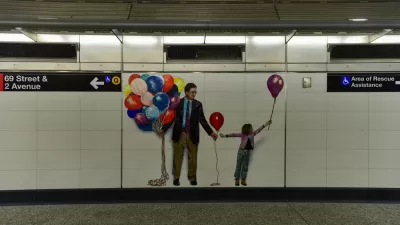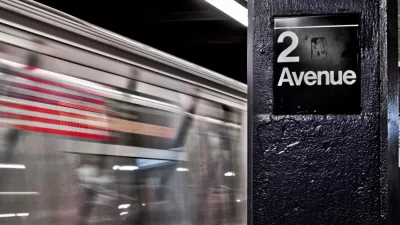The New York Times has a potential damning report about shortcuts taken by the New York MTA, under the leadership of Governor Andrew Cuomo, to deliver the Second Avenue Subway on its scheduled opening date at the beginning of the year.

"In a rush to finish New York City’s long-awaited Second Avenue subway by a New Year’s Day deadline imposed by Gov. Andrew M. Cuomo, the Metropolitan Transportation Authority failed to complete final safety testing before opening the line to the public," reports Emma G. Fitzsimmons.
Fire systems were still being tested when the new subway opened on January 1, adds Fitzsimmons. "Now more than eight months after the lavish opening, complete with sparkling wine and an elegant midnight celebration on New Year’s Eve, the subway line is still operating under a temporary safety certificate, according to the Federal Transit Administration." Another detail of the ongoing status of safety systems on the city's newest subway: "Crews have had to be posted along the line to watch for fires — an expensive effort meant to serve as a stopgap."
Fitzsimmons discovered the status of safety on the new subway line through a Freedom of Information request for reports prepared by Urban Engineers of New York for the Federal Transit Administration.
The article includes a quote by John McCarthy, a spokesperson for the Metropolitan Transportation Authority, defending the safety precautions in place on the new subway line. MTA Chair Joseph J. Lhota also states that the subway line was not opened prematurely. Still, thousands of defects were still waiting to be fixed in May, and there is not shortage of sources willing to say that the opening circumvented safety protocols.
The article is allowed a word count commensurate with the seriousness of the accusations made by the reports, so there is a lot more detail included in the source article.
FULL STORY: Months After Second Avenue Subway Opening, Safety Testing Is Not Finished

Maui's Vacation Rental Debate Turns Ugly
Verbal attacks, misinformation campaigns and fistfights plague a high-stakes debate to convert thousands of vacation rentals into long-term housing.

Planetizen Federal Action Tracker
A weekly monitor of how Trump’s orders and actions are impacting planners and planning in America.

Chicago’s Ghost Rails
Just beneath the surface of the modern city lie the remnants of its expansive early 20th-century streetcar system.

Bend, Oregon Zoning Reforms Prioritize Small-Scale Housing
The city altered its zoning code to allow multi-family housing and eliminated parking mandates citywide.

Amtrak Cutting Jobs, Funding to High-Speed Rail
The agency plans to cut 10 percent of its workforce and has confirmed it will not fund new high-speed rail projects.

LA Denies Basic Services to Unhoused Residents
The city has repeatedly failed to respond to requests for trash pickup at encampment sites, and eliminated a program that provided mobile showers and toilets.
Urban Design for Planners 1: Software Tools
This six-course series explores essential urban design concepts using open source software and equips planners with the tools they need to participate fully in the urban design process.
Planning for Universal Design
Learn the tools for implementing Universal Design in planning regulations.
planning NEXT
Appalachian Highlands Housing Partners
Mpact (founded as Rail~Volution)
City of Camden Redevelopment Agency
City of Astoria
City of Portland
City of Laramie





























